| Early youth in Goch and Dinslaken |
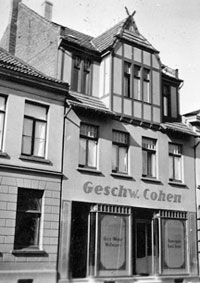 |
"Joseph was born in Goch, 13 February 1925. His father Menachem (Mendel) Seligman died when Joseph was only 2 years old, He grew up at his grandparents house in Goch until he was 6 years old. Our father Joseph frequently told us about the ancestry of his father ; fom the important, large and well-known family of Rabbi Mendel Rosenbaum from Zell In 1931 , when J oseph was 6, his mother, Betty Seligman moved to Leipzig where she worked, manag ing a Jewish home for elderly ladies. J oseph 's grandmother (Friederike Oppenheimer) j oined Betty in 1938 and lived in the "Home" in Leipzig. Friederike died in November 1941 and was buried in the Leipzig. Betty had a visa for em igration to the USA, but she had preferred to stay with her mother and the old ladies. The "Home" was under the protection of an American organization and an American flag was on the building. Nevertheless, in December 1941, after the Japanese attack on Pearl Harbor and the USA joining the war , the Nazis deported all the inhabitants of the "Home" to Auschwitz. Betty Seligman was murdered in Auschwitz. The exact day of her death was unknown; therefore Joseph kept the date of deportation as the Memorial Day for his mother. When Betty moved to Leipzig Joseph was sent to a children's home in Dinslaken, run by Dr. Rothschild. He stayed there until the "Kristallnacht" of 9 th -10 th November 1938, ( when Joseph was about 13½ years old).
|
On the memorial document at Yadvashem Joseph mentions as the date of deportation the 13th of July 1942 An other source mentions that the members of the Old peoples home were deported on the 19th of September 1942.
|
Shop and home of the Grandparents of Joseph in Goch. He lived here until he was 6 years old. (Goch Voßstraße 42)
|
||
|
||
| The "Reichkristallnacht" in Dinslaken ("Prozession of the Jews") | ||
A few years before his death, Joseph gave testimony in Yad Vashem of what he had then experienced: |
|
|
"That day a great tension was felt in the town and the children did not go to the Jewish school. In the evening a group of "Black Shirts" gathered in front of the children's "Home" with yelling and threats and started to pound on the doors and windows. Dr. Rothschild was on his way to Palestine, trying to bring the children there. The children (36) with their instructors fle d through the back garden to the police. Police officer Schultz took them back and they hid in the garden. Meanwhile the hooligans broke in and destroyed everything in the house. Schultz tried to drive them away. ....(After the war Joseph came back to the town and found out that Officer Schultz was deported to Dachau KZ and probably was murdered there) ..... The next day members of the Jewish community buried the remnants of the torn Torah scrolls."
|
I Other testimonies mention that the SA (brown shirts) was seen. It is unlikely that many SS members took part.. |
|
After the war Joseph came to the town and found that Officer Schultz was deported to Dachau KZ and probably was murdered there. Next day members of the Jewish community buried the remnants of the torn Torah scrolls.
|
||
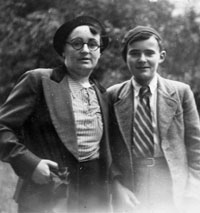 |
It was arranged that the children would be transferred to Antwerp, Belgium. Joseph spent one week with his mother in Leipzig. She decided that it would be better that he should go to Belgium. He was 14 and that was the last time he saw her.
|
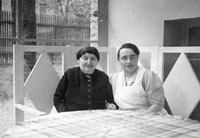 |
Betty and Joseph Selgimann in Leipzig 1937 |
|
Betty and her mother Friederike |
| Josef fighting for the resistance in Belgium | ||
In Belgium he started to study horticulture (which became his main occupation later in life). |
||
In May 1940 the children were supposed to “make Aliyah" – em igrate to Eretz Israel, after they had received the certificates. However, on May 10 th the Germans attacked and occupied Belgium. The children with many other refugees tried to flee to France or England via the sea . The bombarded roads were blocked with refugees. The Germans loaded the children with other refugees on trucks and brought them back to Antwerp and then to Brussels. |
||
At the end of 1941 the Germans started to confiscate the identity cards of the Jews and Joseph (almost 17) decided to join the underground. The underground headquarters (under the cover of an “ Insurance Company ”, was located on the 3 rd floor of the same building where the Gestapo was based, on the 2 nd floor… |
||
Joseph, with other young members of the Resistance, was transferred to villages, at first without hiding their Jewish identity. He was allocated to a horse stable. Once when the farmer became drunk he patted Joseph on the back, saying "there are some good Jews…". He was immediately instructed to leave the farm because some of the F lemish / Waloons were anti-semites and informed on Jews to the Gestapo. |
||
He obtained forged papers and went as a Belgian worker to work on the farm of a director of small rural railway station, not far from a major train junction. He was ordered to hide his Jewish identity and even to go to Church on Sundays. At night he joined sabotage actions like dynamiting rail lines. During the day he worked on the farm. He even became friendly with the priest, participated in ringing the church bells and often played games of chess with him. One day when listening to the BBC, on the radio, hidden in the attic, (it was part of his underground chore) he heard the Chief Rabbi of England telling the Jewish soldiers that Yom Kippur eve was due that evening, and he almost missed it. Pretending he was sick he refrained from eating on that holy day. He received with great excitement the news of the invasion of Normandy in 1944. |
||
| Fighting with the dutch army | ||
He was 19 and after a few months he joined the free Dutch army while the troops passed near by. With his uniform he went to say goodbye to the farmer and to his good friend the priest. The priest asked him why he had not participated in Mass that day and was stunned (Joseph said: "He fell off the chair out of astonishment") to hear that Joseph was Jewish. As Joseph phrased it: "the acting is over now". |
||
"Our father fought in the ranks of the Dutch army in the Netherlands and North Germany. Since he spoke German he became an interrogat ion officer, when the war ended. He interrogated German prisoner soldiers in order to decide whether they were active as Nazis." |
(Obituary of the children of |
|
| Back to the destroyed town of Goch | ||
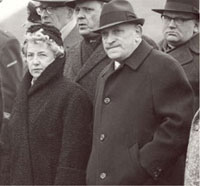 |
While in the army he visited Goch which was quite in ruins. The house of his grandfather was intact. Of the original Jewish residents he met only the Valk couple that had returned from the concentration camps. They were in desperation; they learned that their daughter Lena had been killed in Sobibor concentration camp during 1943. In 1939 she was smuggled to the Netherlands but was caught and transported to her death. Their house was in ruins and Joseph found them in bad shape, living in the cellar. He brought them food and cloths from the army and arranged with the local British commander that they could live in the house of his grandparents. The Valk family stayed in Goch and made it their goal to convey to the German people the horrors that they went through in the camps. Mrs Valk was deeply involved in the initiative to rename the Goch Realschule Leni-Valk- Realschule on the date of her birthday 28 September 1979. Our father kept in touch with Mrs Valk all his life. She visited Israel several times and our father visited her. She used to call Joseph "my Kaddish".. |
Leni went to her uncle in Leeuwarden (Netherlands) and went to school there for some time. On the 18th of May 1943 she was deported to Sobibor. At the 21st of May she got there and was murderd.
|
Mrs. Valk (links) at a memorial ceremony. |
Kaddish is the Jewish prayer for the deceased. The childrens home in Dinslaken was financed by a Kaddisch foundation. Therefore the children had to pray for the deceased. |
|
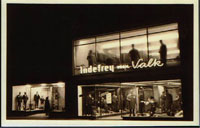 |
||
Shop of the family Valk, which they had taken over from Jospeh Seligmann as a representative of the Oppenheimer family. |
||
| Officer in the Far East | ||
|
(Obituary of the children of Joseph Seligmann) |
|
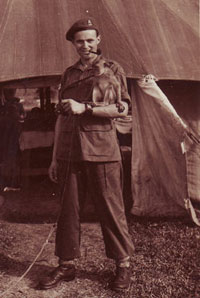 |
"In the winter of 1945 an order came that our father's group in the army would be sent to England for an officers training course of 3 months and then to the Dutch colonies in the Far East. He told us that it was a very difficult decision to follow this order. At first he even thought to become a deserter from the army and enter as a refugee one of the " Displaced Persons Camps". In the end he stayed in the army, not willing to become a refugee again. He strongly desired to reach Eretz Israel and hoped to fulfill this after his service. After the training he was sent to Indonesia and was appointed Welfare Officer for the Jewish soldiers. He also looked after their cultural – religious affairs." He organized first Passover Seder in the colonies, both for the Jewish soldiers and the civilian Jew ish prisoners, just freed from the Japanese camps. In t his office he flew to all the parts of the Dutch colonies, where Jewish soldiers were stationed
|
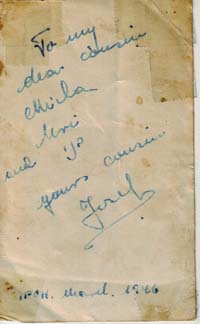 |
Joseph Seligmann 1946, Officer in the Dutch Army in the Far East. |
Backsite of the photo with greatings to his cousins Micha, Uri und Benjamin |
|
| Finally in Palestine | ||
He was released from the army in September 1947 and asked that this would be in Palestine (still under the British Mandate). He sailed to Port Said, Egypt and took the last train from Qantara to Palestine (the line closed due to the disturbances that had started on the eve of the establishment of the Jewish State).
|
||
After his arrival he first visited all his relatives here. His cousins said: "The negro from India arrived"; he was very sun tanned. One of his early visits was in Ein Harod to meet his uncle, (my father) Dr. Arthur Oppenhemer. Then he went to spend the Shabbat in the Orthodox, religious Kibbutz Tirat Tzvi, in the Beit Shean valley, not far from Ein Harod. Some years later he came again to visit a friend in Tirat Tzvi with his new wife Battia. In the dining hall a senior member approached him, saying: "You know that when you first came in 1947, a dark tanned young man, walking like a soldier, speaking perfect English and bad Hebrew, strange stories of the underground in Belgium and service in the Far East, we suspected that you were a spy… . In Shabbat we phoned Ein Harod to verify your story."
|
Comment of Micha Ofir:
|
|
Comment of Micha Ofir: "It is unthinkable for an orthodox Jew to use the phone during the Shabbat. It is allowed only in a case of danger to life. 'To save life one may break the Shabbat'“ |
||
| Ausbildung im Bereich Garten- und Landschaftsbau und Leben im Kibbuz | ||
"Our father started to work as a practitioner gardener at the Botanical Garden in the agricultural high school Mikwe Yisrael, (south of Tel Aviv). he spent Saturdays with his aunt Grete in Kvutzat Yavneh . When the battles with Arab forces started in the months before the Independence War he enrolled in the Hagana h ( the military organization which preceded the Israeli Defense Forces ) and became deputy commander of the para -military forces in Yavneh. When the war started he was appointed company commander of the Kibbutzim members around Yavneh. On the eve of Yom Kippur (October 1948), when the Egyptian army advanced to 4 km from Yavneh, he participated in the "Ten Blows" operation to drive the Egyptian forces back . This operation developed into “Operation Yoav” that freed the Negev. During the fighting Joseph was wounded, hospitalized and released from the army."
|
(Obituary of the children of |
|
He returned to Yavneh and joined a group of "Bacha"d: A union of religious pioneers from England that prepared to start a new settlement Kibbutz in the lower Galilee. At the beginning of 1949 his group moved to the Galilee and started the new settlement, the religious Kibbutz "Lavee" (lion in Hebrew).
There Joseph met and married Battia. |
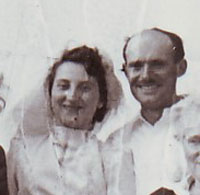 |
|
After a few years they left the Kibbutz. Our father was appointed the director of the plant nursery at the Rupin, technical – agricultural high school, (near Hadera in Emek Chefer – the coastal plain between Haifa and Tel Aviv). In 1954 they built their home in Beth Chazon quarter, annexed to Moshav Kfar Haroe. |
Battia and Joseph Seligmann at there marriage (5th of May.1950) |
|
| Studying Gardening and Landscape Architectue in England | ||
In 1956 he was sent by the Ministry of Agriculture to England to study Gardening and Landscape Architecture, came back at the end of 1957. In 1960 he was appointed Landscape and Gardening Architect of the town of Nathania and kept this post until his retirement in 1984. His many friends and colleagues arranged an unforgettable party: "This was your life story". He continued to advise and teach and helped to educate a new generation of gardening technicians. In 1986 he received certificates of appreciation from the Ministry of Interior Affairs and organization of gardeners for his contribution to the profession of gardening and landscaping in Israel.
|
||
| Joseph´s Story | ||
"Our father had a rich treasure of personal, piquant stories from all of his life phases. He used to tell his stories with humor, a bright and radiant face and his special contagious laughter. His relations with other people including his colleagues and subordinates were always warm, generous and personal. He fulfilled the religious commandments in a high style, as much as possible. He passed away ("was asked to the heavenly Yeshiva") on the 2 nd day of Rosh Hashana (Jewish New Year), 2 nd Tishrei 5649 (13 September 1988), just before the blowing of the Shofar. Let his memory be blessed .”
|
(Obituary of the children of Shofar = Horn, that in blown at special religious ceremonies |
|
Quellen:
Neben den im Impressum angegebenen allgemeinen Quellen sind hier insbesondere zu nennen:
| Dateiname: | foppen6b_l.htm |
| Datum: | 3.2.08 |
| Erstellt von: | Ruth Warrener |
| Fotografien, Bilder: | Dr. Micha Ofir, Stadtarchiv Goch |